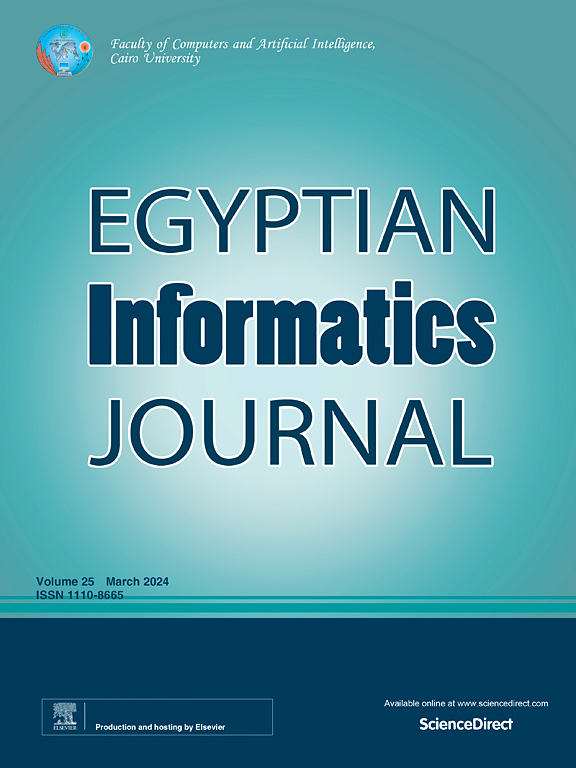TransAdaptNet: a transformer-based adaptive learning model for accurate Monkeypox detection and classification
IF 4.3
3区 计算机科学
Q1 COMPUTER SCIENCE, ARTIFICIAL INTELLIGENCE
引用次数: 0
Abstract
The rise of Monkeypox (MPX) as a global health issue requires efficient and swift diagnostic techniques. In this paper, a Transformer-Based Adaptive Learning (TransAdaptNet) framework is proposed to enhance MPX detection and classification. The framework includes advanced AI methodologies, such as transformer-based models and adaptive learning systems, to significantly enhance the accuracy and efficiency of diagnosis. The proposed TransAdaptNet consists of two modules which are; data preprocessing, and patient classification. Through data preprocessing module, the used data set are preprocessed through several stages; remove/fill null values, remove outlier items, feature extraction and selection. A new feature selection methodology called Improved Whale Optimization Algorithm (IWOA)is introduced within the preprocessing pipeline. IWOA consists of two phases which are; Multi-Selection Phase (MSP) using two filter methods which are; fisher score and chi-square while Final Selection Phase (FSP) using Binary Whale Optimization Algorithm (BWOA) with union operations. Then, these features are fed into proposed patient classification module. TransAdaptNet achieved an exceptional accuracy of 98.7% utilizing a publicly accessible dataset comprising 500 monkeypox-positive and negative cases, surpassing conventional models like Random Forest and XGBoost. The framework has proven its ability to perform calculations quickly, avoiding the high costs associated with complex architectures such as transformers and attention mechanisms. TransAdaptNet produces clear outputs, enhancing the clarity of its predictions. The modular design ensures applicability in diverse healthcare settings, facilitating implementation. This method overcomes the limitations of traditional diagnostic tools, providing an effective and reliable means of identifying and mitigating MPX outbreaks at an early stage.
TransAdaptNet:一个基于变压器的自适应学习模型,用于准确的猴痘检测和分类
猴痘(MPX)作为一个全球性卫生问题的兴起需要有效和迅速的诊断技术。本文提出了一种基于变压器的自适应学习(TransAdaptNet)框架来增强MPX的检测和分类。该框架包括先进的人工智能方法,如基于变压器的模型和自适应学习系统,以显着提高诊断的准确性和效率。拟议的TransAdaptNet由两个模块组成:数据预处理,患者分类。通过数据预处理模块,对使用的数据集进行几个阶段的预处理;删除/填充空值,删除异常项,特征提取和选择。在预处理流程中引入了一种新的特征选择方法,称为改进鲸鱼优化算法(IWOA)。IWOA包括两个阶段:多选择相位(MSP)采用两种滤波方法,分别是;最后选择阶段(FSP)采用双鲸优化算法(BWOA)进行联合运算。然后,将这些特征输入到所提出的患者分类模块中。TransAdaptNet利用包含500例猴痘阳性和阴性病例的公开数据集实现了98.7%的卓越准确率,超过了Random Forest和XGBoost等传统模型。该框架已经证明了其快速执行计算的能力,避免了与变压器和注意力机制等复杂架构相关的高成本。TransAdaptNet产生清晰的输出,提高了其预测的清晰度。模块化设计确保了不同医疗保健环境的适用性,便于实施。该方法克服了传统诊断工具的局限性,提供了一种在早期阶段识别和减轻MPX爆发的有效可靠手段。
本文章由计算机程序翻译,如有差异,请以英文原文为准。
求助全文
约1分钟内获得全文
求助全文
来源期刊

Egyptian Informatics Journal
Decision Sciences-Management Science and Operations Research
CiteScore
11.10
自引率
1.90%
发文量
59
审稿时长
110 days
期刊介绍:
The Egyptian Informatics Journal is published by the Faculty of Computers and Artificial Intelligence, Cairo University. This Journal provides a forum for the state-of-the-art research and development in the fields of computing, including computer sciences, information technologies, information systems, operations research and decision support. Innovative and not-previously-published work in subjects covered by the Journal is encouraged to be submitted, whether from academic, research or commercial sources.
 求助内容:
求助内容: 应助结果提醒方式:
应助结果提醒方式:


